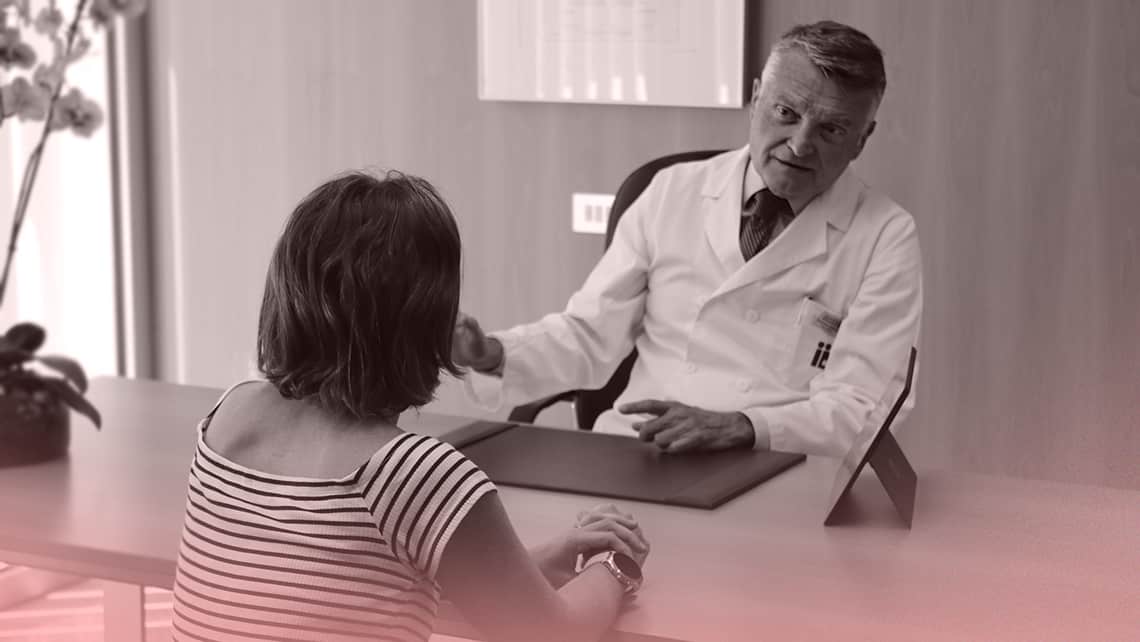
Progress in treatment for patients with poor ovarian response
Personalising courses of treatment is undoubtedly currently the most important area of change in the field of medicine. A specific strategy should be designed depending on each patient’s individual characteristics.

Identified the genes involved in ovarian reserve

Personalized treatment plan

Pharmacogenetics: higher response medication

Higher number of eggs
Índice
Pharmacogenetics: a personalized medicine and tailored drug prescription
One of the key areas for developing personalised medical healthcare is the use of pharmacogenetics. A patient needs different doses or types of pharmaceutical drugs depending on certain genetic variations. With this in mind, Instituto Bernabeu is proud to have developed a test that analyses different genetic variants and allows us to determine which patients can benefit from increased doses of medication. It also gives an indication of the most appropriate pharmaceutical drug for each type of patient.
This is particularly useful in patients who have poor ovarian response since obtaining an additional oocyte can mean the difference between success and failure. Therefore, including pharmacogenetics in the way poor ovarian response patients are treated gives us the assurance that personalised treatment strategies provide us with the best possible efficiency at a lower cost and with maximum comfort for the patient.
Cryobiology, double ovarian stimulation and Double IVF
Another field in which huge steps forward have been made over the last few years is cryobiology. Both oocytes and embryos can be frozen with no cause for worry since they evolve entirely normally afterwards. This gives us the confidence to focus on designing strategies that champion efficiency. As demonstrated by our team, we are currently able to begin ovarian stimulation at different times during a woman’s menstrual cycle without having a negative impact on performance. We can even do two rounds of stimulation in a single cycle. This gives us the largest possible number of oocytes in the shortest possible time.
Double ovarian stimulation allows us to accumulate eggs from several stimulation cycles. In some patients, however, the competence of the vitrified egg may be diminished. In these cases, we recommend a double IVF during the double stimulation process, fertilising the fresh oocytes to accumulate embryos. (more information about Double IVF)
Strategies such as these help us to increase the chances of success, not only in terms of achieving a pregnancy, but also in terms of having more children in the future because there is an increased chance of having stored frozen embryos.
“Rejuvenation” or ovarian activation techniques
Recently, procedures have been implanted with promising results in patients with poor prognosis. These are ovarian activation treatments, which promote the development of follicles that remain dormant in the ovary.
For this purpose, we administer platelet-rich plasma into the ovary to increase the number of eggs obtained in patients with low ovarian response (See more information on platelet-rich plasma for low ovarian reserve).
On the other hand, the ovarian fragmentation technique attempts to achieve spontaneous cycles or response to stimulation in patients with ovarian failure or early menopause. (See more information on ovarian fragmentation).
These techniques will increase the possibility of achieving pregnancy with their own eggs in patients whose current alternative is egg donation.
As we have seen, constantly progressing in the use of the very latest technology whilst always practising medicine that focuses on the patient (a key element of the Instituto Bernabeu philosophy), means we can stretch the possibilities of personalised medicine and give women with poor ovarian response the assurance that we are doing everything in our hands to make her eager wish of having a family come true.
It may also be of interest to you:
- Poor responders treatment unit
- Double stimulation: is it possible to recover more oocytes in patients with low ovarian reserve?
- What is the Ovarian Reserve? How important is it for fertility?
- Genetics in premature ovarian failure and menopause
- Anti-Müllerian Hormone (AMH): Know the Age of your Ovaries
- Poor Ovarian Response: progress in genetics
- Accumulation of oocytes in patients with a low response
- Premature Ovarian Failure, Can I be a mother? Causes, symptoms, diagnosis, treatment and prevention
- Ovarian stimulation during the luteal phase
